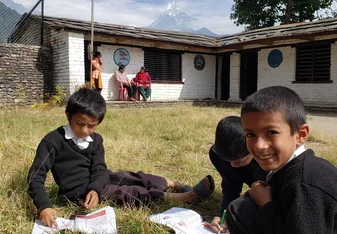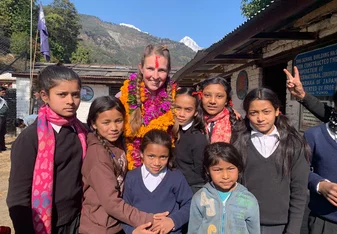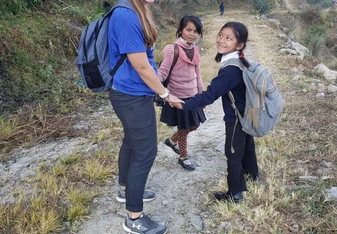Why did you choose this program?
I found this program years ago and was intrigued by the opportunity to teach, travel, and be active all at the same.
I was looking for something off the beaten track, that most people do not get the opportunity to do, and somewhere I could volunteer for a longer period of time. Once researching more about the program and going through my first interview, I realized that my values were in line with those of the program and that it would be a great fit.
What did your program provider (or university) assist you with, and what did you have to organize on your own?
I organized this trip completely on my own, as I was already a teacher in Canada and had found this program independently. I submitted an application to Trek to Teach, met with them for two interviews and then, once accepted, followed their very thorough and detailed instructions for preparation and pre-departure.
TTT truly covers all its bases and does everything they can to assist the teacher prior to arriving and in Nepal.
What is one piece of advice you'd give to someone going on your program?
Challenge yourself. Know that this program is not going to be a walk in the park, but will challenge you physically, emotionally, and mentally in so many different ways. It is incredibly demanding and will push you to the edge of your comfort zone and beyond; however, that is where growth happens. An incredible amount of growth.
So go, experience this, with an open mind, an open heart, and a willingness to learn from every moment.
What does an average day/week look like as a participant of this program?
In the village, I woke up quite early due to the sun and movement of my family - generally around 7 am. I would often finish lesson planning in the morning or take time to catch up with friends and family back home, as the time change was convenient in the morning.
Around 9:15 am, I set off to school, as it was a good 20-25min walk up to the school each day. I taught 3 classes in the morning, broke for "tiffin" (lunch) at 1, played volleyball with the older students, then resumed classes for the afternoon.
When school finished at 4 pm, I walked down with the students or went to the volleyball ground to wait for the 4:30 pm daily game with local guys. Afterward, I would go back to my guesthouse, catch up with my host family, help with any chores I could, including preparing for dinner.
We ate dinner around 7 pm, on stools in the kitchen, then I spent the evening with my host family little sister and neighbor girls. I often read books or watched videos and then went to bed anywhere between 8-10 pm.
Going into your experience abroad, what was your biggest fear, and how did you overcome it? How did your views on the issue change?
My greatest fear about Nepal was having to leave and say goodbye.
I had said a lot of goodbyes in my life recently and was fully aware that being in Nepal for so long, I would likely forge strong ties and relationships to the village and its people. I prepared myself and the students as best I could for my leaving; however, it was still difficult.
It was tough knowing the situation I was leaving some of the students in; however, I needed to remind myself that that life is all they know. It's not up to me to change their lives, situations, or circumstances; rather I had become one small part of their world for the time I was there.
There will always be goodbyes and people you wish you could take with you, but I left knowing that I did all I could to be a positive presence in their life, hopefully, instilled happiness, and left some of them with memories that they will carry forward throughout their lives.
In what ways were you challenged that you did not expect?
Although I knew cultural differences would be abundant, there were several times I was not prepared for what I was going to experience.
There were several practices in the community, at home, and especially at school, that are very much so different from those of western society and the life I am used to at home. Moments like students getting hit by teachers in front of the entire school for not knowing their times' tables, watching a shaman perform a cultural ritual on a girl who they believe has demons or being looked down upon by an entire group of people who do not understand you and cannot communicate with you.
I felt as though a lot of times I had to take a step back, bite my tongue, and ride out the moment. As much as I didn't agree with what was happening, or was uncomfortable, I had to accept that those feelings were my baggage. I felt that way because of the life I lead at home; however, that's not how life is here. I could not always change those moments - nor was entitled to, or needed to - but I could learn something from it.


